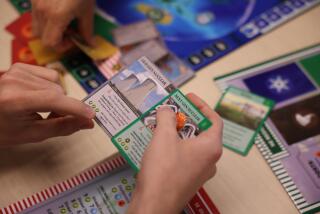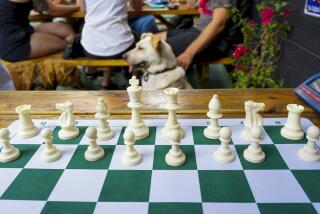POLITICS : Mathematicians Have a Theory About Games Washington Plays : Leaders have an instinct to win at all costs, but an analysis of strategies shows that nice guys who compromise often finish first.
- Share via
As the nation watches its leaders butt heads on issues such as Bosnia, the budget and the future of the environment, it’s somewhat reassuring to think that such ugly conflicts are, after all, nature’s way. According to conventional wisdom, winning strategies are anchored in self-interest. Charles Darwin’s idea of survival of the fittest suggests that only the meanest, most competitive, most selfish individuals will make it to the top of the evolutionary heap.
Mathematicians, however, know differently. For at least two decades, specialists in a field of mathematics called “game theory” have held as a primary tenet that nice guys can and frequently do finish first.
According to those mathematicians, who have studied the nature of winning strategies--which is what game theory is all about--the parties to the nation’s large-scale political disputes often shoot themselves in the foot, strategically speaking, ensuring the worst possible outcome for everybody.
“You get into these situations where everyone loses,” said New York University political scientist Steven Brams. “It’s a pathology. Game theory gives you a very clear view of the problem so you can understand how they can blow it.”
Game theory has less to do with board games, like chess, and more to do with strategy--anything from bargaining for a raise to budget negotiations or disarmament. Essentially, the theory assigns numerical values to various strategies in well-defined conflicts, making it possible to calculate winners and losers. Last year, the field finally received a much-welcomed stamp of approval from the Nobel Committee when the economics prize was awarded to two Americans and a German for what amounted to works of pure mathematics.
During the past decade, game theorists have concentrated on coming up with workable ways to get out of conflicts. And perhaps surprisingly--at least to many in the current, confrontational generation of politicians--the strategies that stem from the most up-to-date mathematical research sound a lot like old-fashioned homilies: think ahead, cooperate, don’t covet your neighbor’s success and be prepared to forgive those who trespass against you.
Game theory groups similar kinds of conflicts into well-defined categories. The federal budget deadlock, for example, fits into a category that mathematicians--and children--call games of “chicken.”
Chicken is a familiar game to anyone who saw James Dean almost (but not quite) drive his car over a cliff in “Rebel Without a Cause” or who lived through the Khrushchev-Kennedy standoff during the Cuban missile crisis. The characteristic of these games is that the person who backs down first loses, but refusing to back down at all may risk losing even more.
“That’s what we had a couple of weeks ago,” Brams said. “It’s total impasse. Both die. Government shuts down.”
The logical problem in such games is that the best outcome for both players would come about through cooperation--each agreeing to swerve away from the edge just before either car goes over the cliff--but each player has a strong temptation to try to cheat and get the better of the other guy.
Another type of game that theorists study is the so-called “prisoner’s dilemma”--a scenario familiar to anyone who has watched a TV cops show. In the prisoner’s dilemma, two partners in crime are kept in isolated cells. Each is told that if he blows the whistle on the other, he might be able to go free. If he remains mute, each prisoner knows, the authorities might not have enough evidence to convict him--unless, of course, the other prisoner rats on him first. What strategy works best--keep silent or strike a deal?
“There’s a lot of motivation to do something that’s good for you that’s bad for your neighbor,” said Claremont mathematician William Lucas.
To try to determine what the best strategies are for playing such games and winning, game theorists have run elaborate computerized simulations. To almost everyone’s surprise, the most successful strategy turned out to be an ingeniously simple program created by Anatol Rappoport at the University of Toronto. Called Tit for Tat, the program’s first move is always to cooperate. After that, it simply echoes whatever its opposition does. If the opposition cooperates, Tit for Tat cooperates. If the opposition attacks, Tit for Tat retaliates in kind.
In this sense, Tit for Tat embodied both biblical injunctions: an eye for an eye, and the Golden Rule. Or as William Poundstone summed it up in a book about classic game theory problems, the program’s message is: “Do unto others as you would have them do unto you--or else!”
By not ever being the first to attack, Tit for Tat was what Robert Axelrod of the University of Michigan called a “nice” program. As it turns out, most of the winners in computer simulations that Axelrod has run have been nice; most of the losers were not. Tit for Tat could also be forgiving--that is, even after the opposition attacked, Tit for Tat would occasionally give cooperation another try. The lesson, says Axelrod is “be nice and forgiving.”
Other programs, he says, “made systematic errors of being too competitive for their own good, not being forgiving enough.”
It is also important to be clear. Very complex computer programs fare no better than random ones in such simulated games because no one can figure out what their strategy is and respond in kind.
Brams has made strides in making game theory more realistic. His recently published “theory of moves” takes game theory from a static series of one-on-one contests to a dynamic series of moves and countermoves that starts from a realistic status quo.
For example, it becomes clear that the game of “chicken” in a real-world situation would never lead to the neat cooperative outcomes that emerge in the Tit for Tat program. Think of Adolf Hitler, or Saddam Hussein. If one person always cooperates, then the “bully” has no incentive to change his strategy.
The theory of moves changes the rules so that players can look ahead. Posturing, and looking ready for a fight, could be part of such a farsighted strategy.
Lucas thinks the theory of moves is especially good at getting players out of games of chicken like the budget stalemate. “If you know that you’re going to be playing very serious games very soon, [not cooperating] is going to create great problems in the future.”
So does game theory pave the way to mutual cooperation and happiness ever after for everyone? Sadly, the unanimous answer of mathematicians seems to be no.
“It would be wonderful if it worked,” said Keith Devlin, a mathematician at St. Mary’s College of California in Moraga. “You can’t take the results of game theory and apply them to a real-world situation. Life’s relationships are too complex. [Game theory] only gives you a one-dimensional view of a multidimensional problem.”
As Devlin points out, game theory’s two-player, two-strategy games are no more realistic than the geometer’s perfect circles.
Even John Harsanyi, the UC Berkeley economist who won the Nobel Prize for his work in game theory last year, is wary of attempts to use it to prescribe remedies for human conflicts. But he notes that while game theory cannot provide simple answers to life’s questions, it does, at least, clarify the issues.
“What game theory does is suggest what the different possible strategies are that have any hope of being good, and also gives you some hints at how you can compute value.”
(BEGIN TEXT OF INFOBOX / INFOGRAPHIC)
Who Will Blink First?
Classic game theory shows why President Clinton and the GOP congressional leadership are stuck in a rut as they seek a budget accord. Neither has motivation to change positions. Stubbornly holding out for their own plans--and going for the 4 points--has a big payoff but risks shutting down the government. The theory of moves, however, allow players to look ahead. By looking ahead, Clinton could foresee that a compromise on his part would lead to a compromise on the GOP’s part. Both players--and the country--would come out ahead.
SCORING (Points)
Winner: 4
Compromise: 3
Loser: 2
Shut Down: 1
*****
They compromise
Bob Dole and Newt Gingrich: 3 points
Bill Clinton: 3 points
*****
GOP holds out; Clinton gives in
Bob Dole and Newt Gingrich: 4 points
Bill Clinton: 2 points
*****
Clinton holds out; GOP gives in
Bob Dole and Newt Gingrich: 2 points
Bill Clinton: 4 points
*****
Both sides hold out
Bob Dole and Newt Gingrich: 1 point
Bill Clinton: 1 point
Source: Steven Brams, New York University






